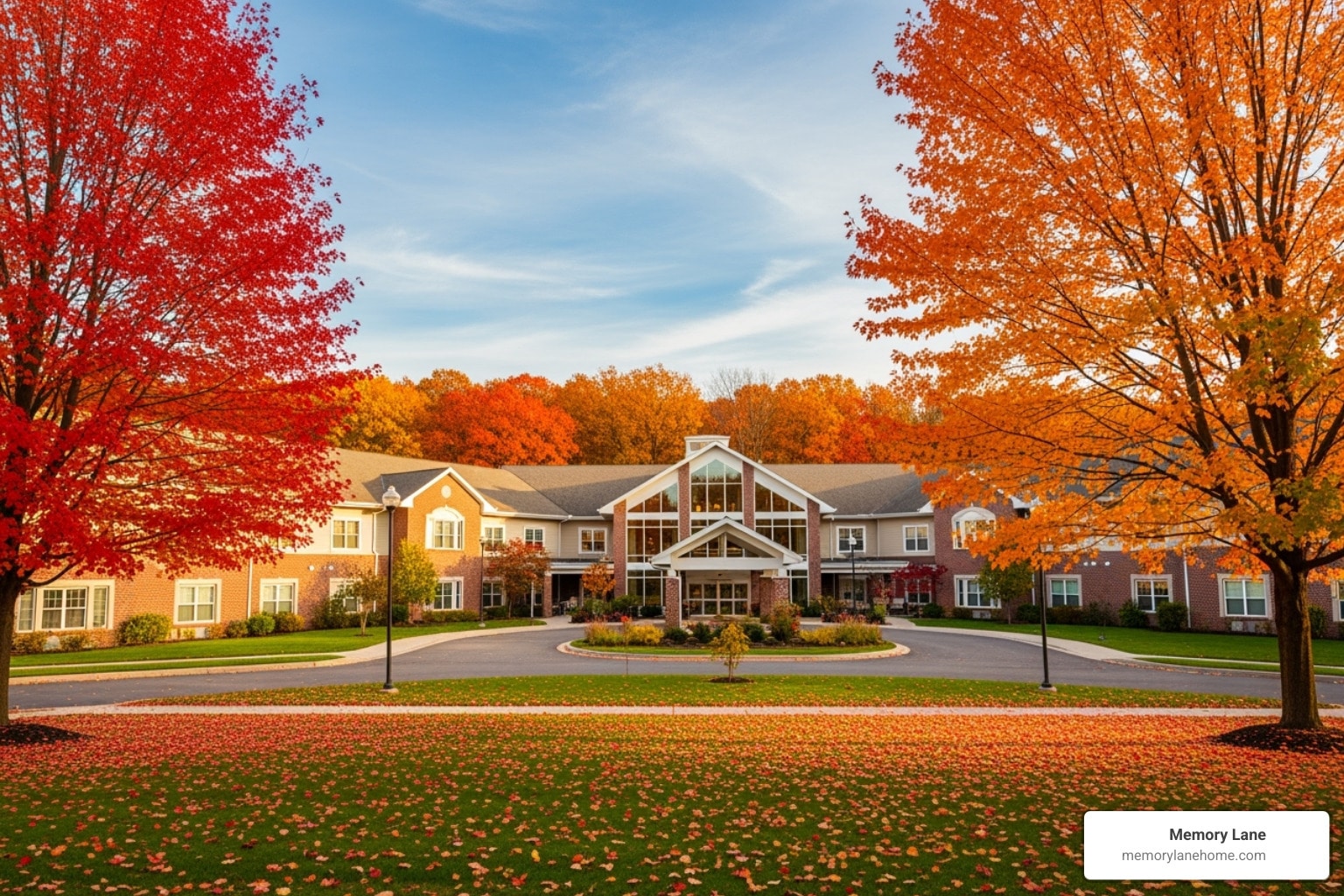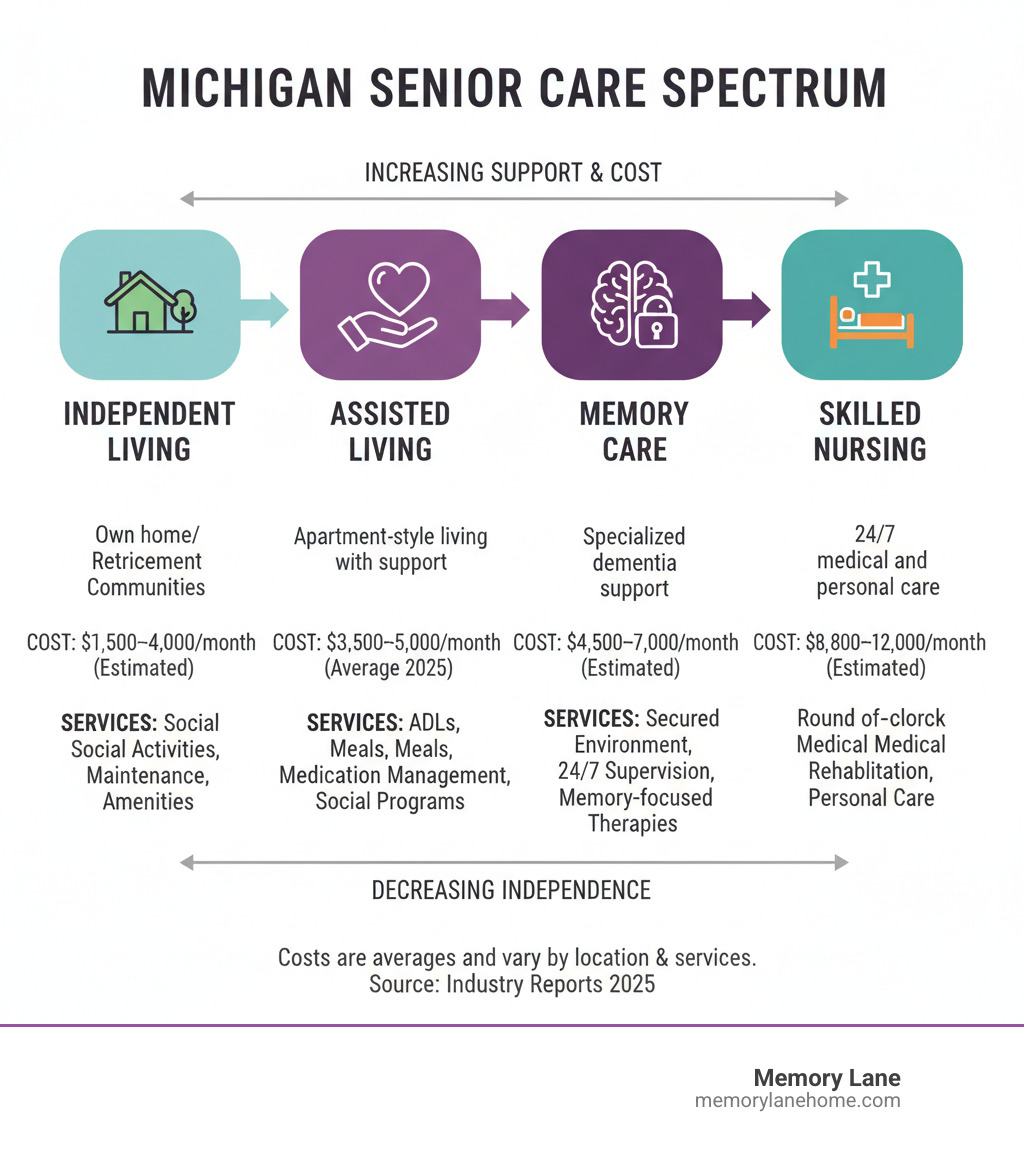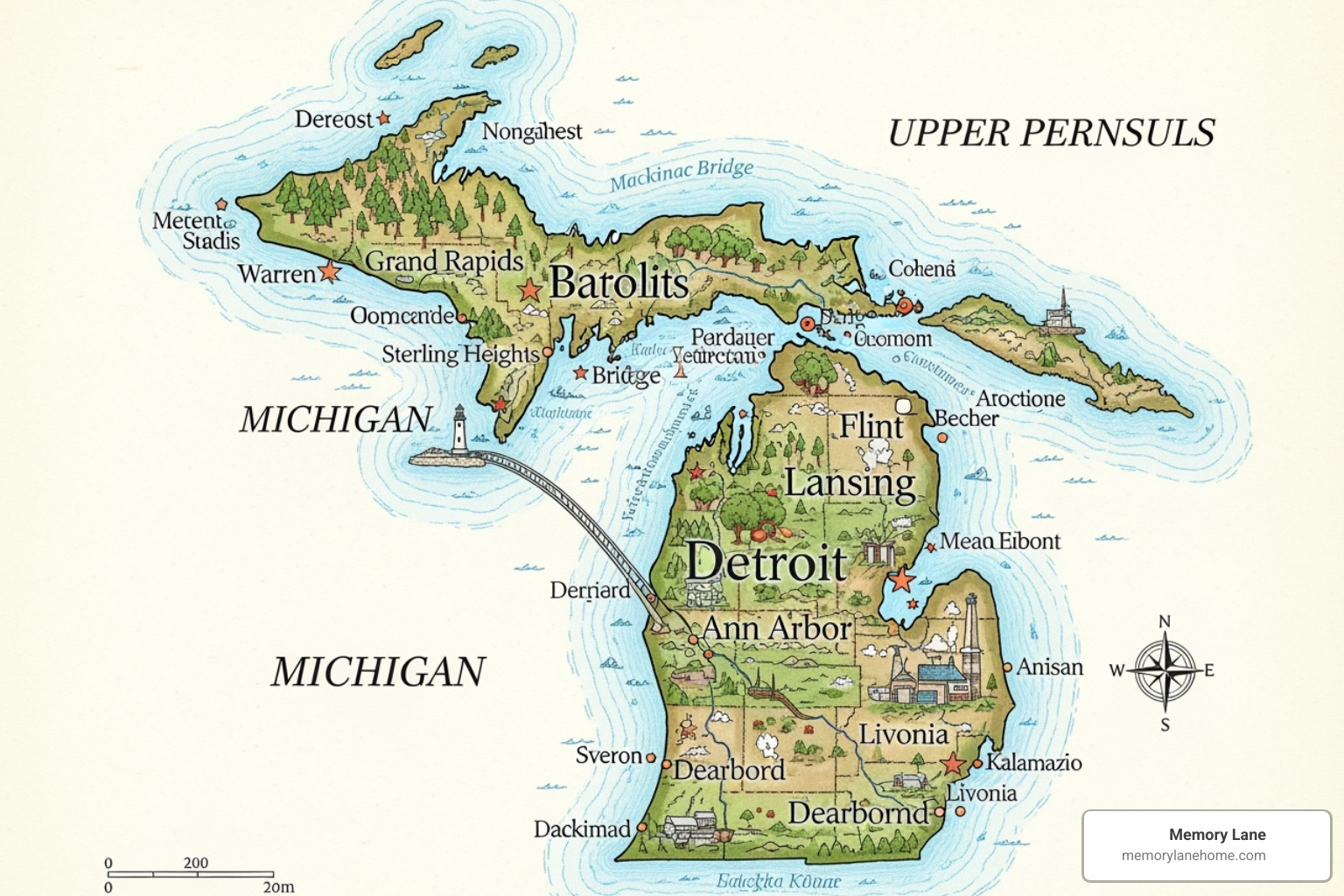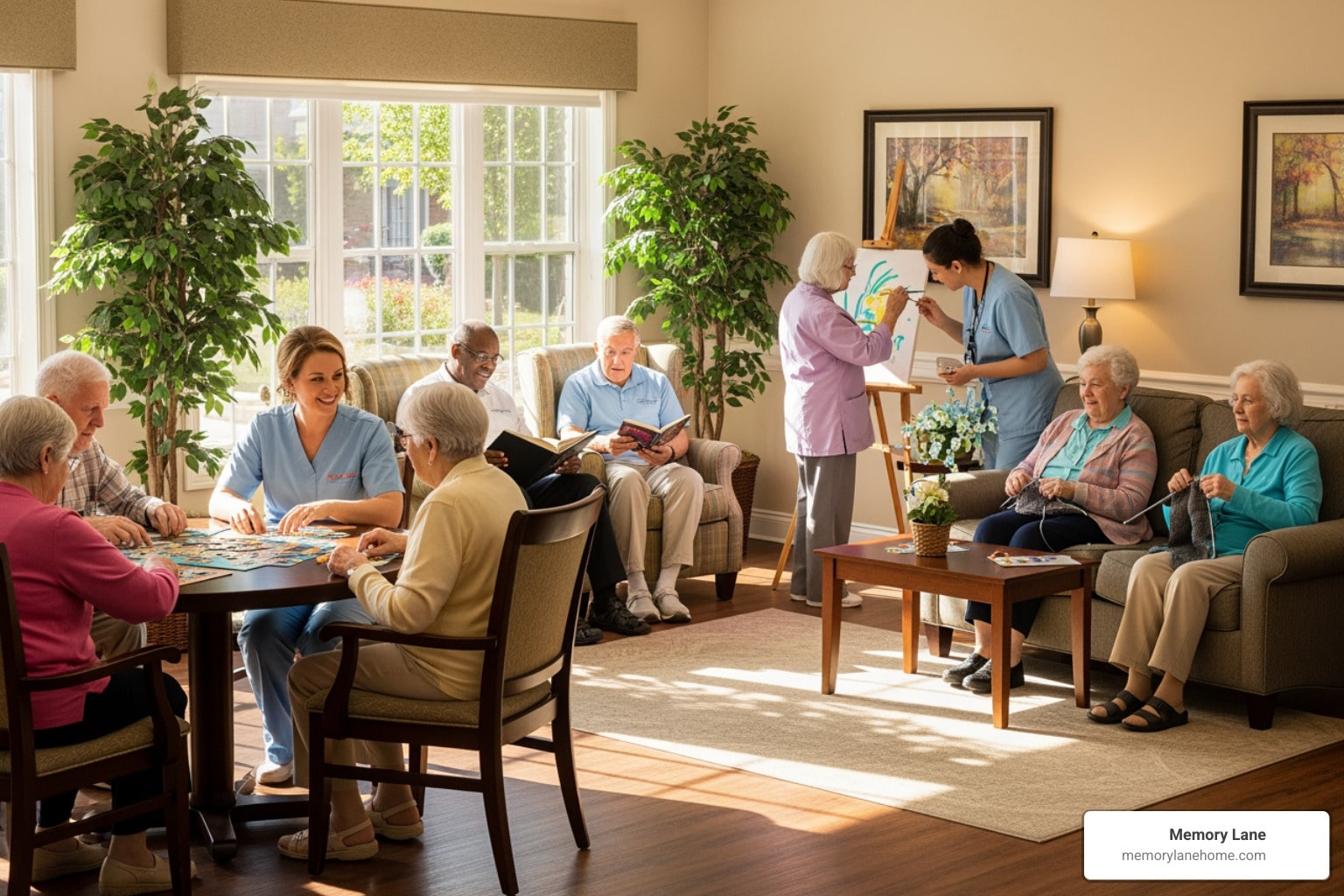Secure the best affordable memory care community wallingford pa. Learn about costs, funding, and how to choose quality dementia support.

Assisted Living in Michigan: Everything You Need to Know for Senior & Dementia Care
Assisted living facilities in michigan: Ultimate 2025 Guide
Why Understanding Your Assisted Living Options Matters
Assisted living facilities in Michigan provide a vital care option for seniors who need help with daily activities but don’t require round-the-clock nursing care. With 4,364 assisted living facilities across the state—ranking Michigan second in the U.S.—families have many choices when seeking the right home for their loved ones.
Quick Facts About Assisted Living in Michigan:
- Number of Facilities: 4,364 statewide
- Average Monthly Cost: $4,566 (slightly below the national average of $4,717)
- Top Cities: Ann Arbor, Detroit, Grand Rapids, Lansing, Livonia
- Financial Assistance: MI Choice Waiver Program, Veterans benefits, long-term care insurance
- Licensing Types: Homes for the Aged (55+) and Adult Foster Care facilities
As the U.S. population ages, the need for quality senior care grows. Michigan has responded by building a robust infrastructure to support its aging residents, boasting an exceptionally high number of facilities.
Assisted living offers a middle ground between independent living at home and full nursing home care. These communities provide:
- Help with Activities of Daily Living (bathing, dressing, medication management)
- Three nutritious meals daily
- Social activities and engagement
- 24-hour staff availability
- Maintenance-free lifestyle
- Safe, secure environments
For families navigating dementia or Alzheimer’s care, specialized memory care units within assisted living facilities offer secure settings, trained staff, and programming designed specifically for cognitive decline.
I’m Jason Setsuda, CFO of Memory Lane Assisted Living and a Board Certified Emergency Medicine Physician with over 10 years of medical experience and 5 years in medical administration. Through my work with assisted living facilities in Michigan and as a visiting physician, I’ve seen how the right care environment can transform quality of life for seniors and bring peace of mind to their families.

Understanding Assisted Living: Services, Benefits, and Types in Michigan
If you’re exploring care options for a loved one, you’ve probably noticed that the senior care world has a lot of different terms floating around. Let’s make sense of it all, starting with what assisted living actually means.
Assisted living is designed for people who need some help with daily activities but don’t require round-the-clock medical care. It’s about finding a balance—more support than living alone, but without the clinical feel of a nursing home. It’s a place where your loved one can get the help they need while still enjoying independence and choice.
The heart of assisted living is helping with Activities of Daily Living (ADLs), such as bathing, dressing, grooming, and moving around safely. Assisted living facilities in Michigan provide this support while encouraging residents to remain as independent as possible.
Beyond daily help, the benefits are significant. Socialization is a key advantage, as communities offer game nights, group outings, and classes that combat loneliness and help residents build friendships. Safety provides peace of mind, with 24-hour staff and emergency alert systems reducing risks like falls. Nutrition is another plus, with chef-prepared meals ensuring residents eat well without the work of cooking. Finally, the maintenance-free lifestyle frees up time and energy for hobbies and family, as housekeeping and repairs are handled by staff.
When comparing assisted living to other care settings, the main difference is the level of medical oversight. Assisted living provides personal care and 24-hour support but isn’t set up for the intensive nursing care found in skilled nursing facilities. It’s ideal for someone who needs help but isn’t dealing with complex medical issues requiring constant monitoring.
Common Services Offered
Most assisted living facilities in Michigan offer a core set of services, though each community adds its own special touches. These typically include:
- Personal Care: Dignified assistance with bathing, dressing, grooming, and mobility.
- Medication Management: Ensuring medications are taken correctly and on time.
- Dining Services: Three nutritious, chef-prepared meals daily, with accommodations for special diets.
- Housekeeping and Laundry: Keeping living spaces clean and fresh.
- Transportation: Rides for medical appointments, shopping, and community outings.
- Social and Recreational Activities: A full calendar of events like exercise classes, arts and crafts, and live entertainment to keep residents engaged.
Specialized Memory Care for Alzheimer’s and Dementia
Memory care is a specialized form of assisted living for individuals with Alzheimer’s or other forms of dementia. These are thoughtfully designed environments that address the unique challenges of cognitive decline.
Secure environments are essential, with controlled access to prevent wandering—a common and dangerous behavior in dementia. This gives families peace of mind knowing their loved one is safe.
Custom activities in memory care are designed for people with dementia. They often include reminiscence therapy, sensory activities, music therapy, and gentle exercise within familiar routines to create comfort and connection.
Specially trained staff make all the difference. Caregivers receive specific training in dementia care, communication strategies, and how to respond to behavioral changes with patience and compassion. The best facilities invest heavily in this training.
At Memory Lane, we’ve built our entire approach around exceptional dementia and Alzheimer’s care. We focus on enhancing quality of life and supporting whatever independence is possible within a secure, nurturing environment. More about dementia care is available on our website if you’d like to learn about our specific approach.
Michigan’s Licensing for Assisted Living
Michigan’s Department of Licensing and Regulatory Affairs (LARA) oversees two main license types that function as assisted living. Homes for the Aged (HFA) are licensed for 21 or more residents aged 55+, while Adult Foster Care (AFC) homes are smaller, serving 1 to 20 adults in a more family-like setting. Both provide personal care and must meet state standards for safety and operations. Michigan is also rated “Exceptional” for its transparency, allowing families to easily access inspection reports and violation histories online, which helps in making informed decisions.
The Landscape of Assisted Living Facilities in Michigan
When it comes to senior care, Michigan truly stands out on the national stage. The state ranks second in the entire United States for the number of assisted living facilities in Michigan—a remarkable achievement, especially when you consider that Michigan ranks 14th in the percentage of residents aged 65 and older. What does this mean for families? Simply put, Michigan has built an exceptional infrastructure for senior care, offering more choices and accessibility than most other states.

Across the state, you’ll find 4,364 assisted living facilities, ranging from cozy, homelike adult foster care settings to larger communities with extensive amenities. This incredible variety means that whether your loved one prefers a smaller, intimate environment or a busy community, there’s likely a perfect match.
About 11% of Michigan’s assisted living communities are concentrated in the state’s top 10 most populated cities, including Ann Arbor, Detroit, Grand Rapids, and Lansing. This means seniors can often find quality care close to their existing support networks and familiar surroundings.
While many facilities are smaller and more intimate, Michigan is also home to large communities, particularly in cities like Ann Arbor, East Lansing, and Grand Rapids, with some offering over 250 beds. These larger facilities represent about 10% of all assisted living beds in the state. This data highlights an important point: Michigan’s senior care market is incredibly diverse, with a mix of large and small communities to suit different needs and preferences.
Larger communities often provide a continuum of care, allowing residents to transition between independent living, assisted living, and memory care. They may also feature extensive amenities like fitness centers, multiple dining options, and robust wellness programs. Their size can support greater staffing resources and strong partnerships with local healthcare providers, and their frequent location in urban areas offers proximity to hospitals and cultural attractions.
At Memory Lane, we focus on providing specialized memory care in a more intimate setting, but we deeply appreciate how Michigan’s diverse landscape of care options ensures every senior can find the right fit for their unique situation and preferences.
Navigating Costs and Financial Assistance in Michigan
Let’s talk about money—understanding the financial picture is essential when exploring assisted living facilities in Michigan. This is an investment in your loved one’s safety, happiness, and quality of life, and you deserve to know what to expect.

The average monthly cost for assisted living in Michigan is around $4,566, which is slightly below the national average. However, costs have been rising, so it’s wise to factor in potential increases when planning your budget.
Geography matters, too. Costs vary by city, reflecting differences in local cost of living and facility amenities. For example, Ann Arbor averages around $4,707 per month, while Detroit is closer to $4,177, and Grand Rapids is about $4,696. For context, specialized memory care—which offers secure environments and specially trained staff—averages around $5,452 per month in Michigan.
Payment Methods
Most families use a combination of funding sources. Private funds (savings, pensions, investments) are common, as is long-term care insurance. Other options include reverse mortgages, converting life insurance policies, or using the proceeds from selling the family home. Each option has financial and personal implications to consider.
Michigan-Specific Aid
Michigan offers several programs that can help ease the financial burden, and we encourage you to explore every option available.
The MI Choice Waiver Program is a crucial Medicaid program designed to help seniors receive care in assisted living rather than nursing homes. While it does not cover room and board, it can pay for personal care services like bathing, dressing, and medication management. To qualify, your loved one must be 65 or older, meet Medicaid financial requirements, and need a nursing home level of care. Contact an Area Agency on Aging I&A specialist at (800) 442-1713 to learn more.
Veterans benefits can be a game-changer. Veterans and their surviving spouses may qualify for programs like Aid and Attendance, which can significantly offset assisted living costs. Visit benefits.va.gov to explore what’s available, and check Michigan VA Benefits and Health Care for state-specific services.
Area Agencies on Aging (AAA) throughout Michigan are invaluable local resources. They connect seniors to nutritional programs, transportation services, and wellness activities. Find your local AAA through Michigan Area Agencies on Aging.
Beyond these primary programs, other state resources can help reduce living expenses, freeing up funds for care. These include the Michigan RX Card for prescription discounts, the Michigan Lifeline Program for telephone service, and the Michigan Energy Assistance Program for help with utility costs. Legal resources like Elder Law of Michigan and Michigan Lakeshore Legal Aid can also provide guidance as you work through these decisions. You don’t have to figure this out alone.
How to Choose the Right Facility in Michigan
Choosing the right assisted living facility in Michigan is one of the most important decisions we’ll ever make. It’s about finding a community where our family members can thrive, stay engaged, and receive the care they need with dignity.
The process can feel overwhelming, but by taking it step by step, we can find a community that truly feels like home.
First, honestly assess your loved one’s needs. Do they need help with bathing or medication? Are there cognitive concerns requiring specialized memory care? What are their social preferences? Understanding these needs helps focus the search.
Next, create a realistic budget. The average cost in Michigan is around $4,566 per month, but this varies by city and services. Factor in the base fee plus potential add-ons, and explore financial aid like the MI Choice Waiver Program or veterans benefits.
Researching assisted living facilities in Michigan
With a clear understanding of needs and budget, you can start researching communities. Michigan offers excellent tools to help.
Online directories are a good starting point to filter by location, services, and price. They provide basic information, photos, and an overview of communities in areas like Ann Arbor, Detroit, or Grand Rapids.
Reading reviews and testimonials offers a window into real experiences. Look for consistent themes regarding staff care, management responsiveness, and activity quality.
Michigan’s state records offer exceptional transparency. The Michigan’s Adult Foster Care and Homes for the Aged search tool is an invaluable resource for checking licenses, capacities, and inspection reports. This level of transparency helps you make confident, informed decisions.
Evaluating potential assisted living facilities in Michigan
Once you’ve narrowed your options, it’s time to visit facilities in person. No amount of online research can replace the feeling of being in a community.

Prepare questions ahead of time. Ask about staff-to-resident ratios, emergency procedures, and care plan customization. For memory care, inquire about staff training and specialized programming.
Observe staff-resident interactions. Do caregivers seem patient, respectful, and genuinely engaged? Positive, unhurried interactions are a sign of a healthy community culture.
Assess cleanliness and maintenance. A clean, well-maintained, and fresh-smelling facility shows attention to detail and respect for residents. Look beyond the lobby to common areas and hallways.
Review activity calendars and menus. Look for a variety of engaging activities that match your loved one’s interests. Check that the menu offers appealing, nutritious options and can accommodate dietary needs.
Beyond the checklist, trust your instincts. Does the community feel welcoming? Do residents seem happy? Visit multiple times at different times of day and, if possible, speak with current residents and their families. Their insights are invaluable. You should be able to imagine your loved one thriving there.
Frequently Asked Questions about Assisted Living in Michigan
As families explore their options for senior care, we often hear the same thoughtful questions come up again and again. We’ve gathered the most common ones here, along with straightforward answers that we hope will make your decision-making process a bit easier.
How many assisted living facilities are there in Michigan?
Michigan has 4,364 assisted living facilities, ranking it second in the U.S. for the number of communities. This provides families with an exceptional number of choices, from small, home-like settings to large communities with extensive amenities.
What is the average monthly cost of assisted living in Michigan?
The average monthly cost for assisted living in Michigan is around $4,566, slightly below the national average. Costs vary by location, with cities like Ann Arbor averaging closer to $4,707. Specialized memory care costs more, averaging around $5,452 per month, due to the additional staff training and security required.
Does Medicaid cover the cost of assisted living in Michigan?
Traditional Medicaid does not pay for room and board in Michigan assisted living facilities. However, the MI Choice Waiver Program can help eligible seniors pay for personal care services within an assisted living setting. Families must still cover the cost of room and board through other means. To check eligibility, contact your local Area Agency on Aging at (800) 442-1713.
Conclusion: Finding Your Path to Quality Senior Care
We’ve covered a lot of ground together, exploring the landscape of assisted living facilities in Michigan. From understanding what assisted living truly means to navigating costs and choosing the right community, we hope this guide has given you clarity and confidence as you move forward.
Michigan’s senior care infrastructure is truly impressive. With 4,364 assisted living facilities spread across the state—the second highest number in the U.S.—families have remarkable access to quality care options. Whether you’re in Ann Arbor, Detroit, Grand Rapids, or smaller communities throughout Michigan, you’ll find facilities ranging from intimate adult foster care homes to larger comprehensive communities. The state’s transparent regulatory environment, overseen by the Department of Licensing and Regulatory Affairs, means we can research facilities with confidence, accessing inspection reports and violation histories to make truly informed decisions.
But beyond the numbers and the research, what matters most is finding a community that feels right. A place where your loved one will wake up feeling safe, engaged, and valued. Where staff members know their name and their story. Where meals are enjoyable, activities are meaningful, and dignity is preserved every single day. This is what we should be looking for—not just care, but genuine quality of life.
For families facing the challenges of dementia or Alzheimer’s, specialized memory care becomes especially important. These aren’t just secure environments with locked doors. The best memory care programs offer something deeper: specially trained staff who understand the unique needs of cognitive decline, custom activities designed to engage and comfort, and secure settings that allow residents to move freely without risk. This specialized approach makes all the difference, providing not just safety but genuine moments of joy and connection.
At Memory Lane, we’ve built our entire approach around this understanding. We know that dementia and Alzheimer’s care requires more than just supervision—it requires compassion, patience, and a deep commitment to seeing the person behind the diagnosis. Our personalized support focuses on what residents can do, not what they can’t. We create moments of success, spark memories, and provide a home where individuals can maintain their dignity and independence for as long as possible.
The journey to finding the right care doesn’t have to feel overwhelming. Take it one step at a time. Assess needs honestly. Set a realistic budget. Research thoroughly using Michigan’s excellent online resources. Visit communities in person. Trust your instincts. And remember, you’re not just choosing a facility—you’re choosing a new home and a caring community for someone you love.
We’re here to walk alongside you through this process. If you have questions about memory care or want to learn more about how we support families in the Ann Arbor area, we’d love to connect. Learn more about our approach to memory care in Ann Arbor, Michigan and find how Memory Lane can provide the specialized, compassionate care your loved one deserves.



